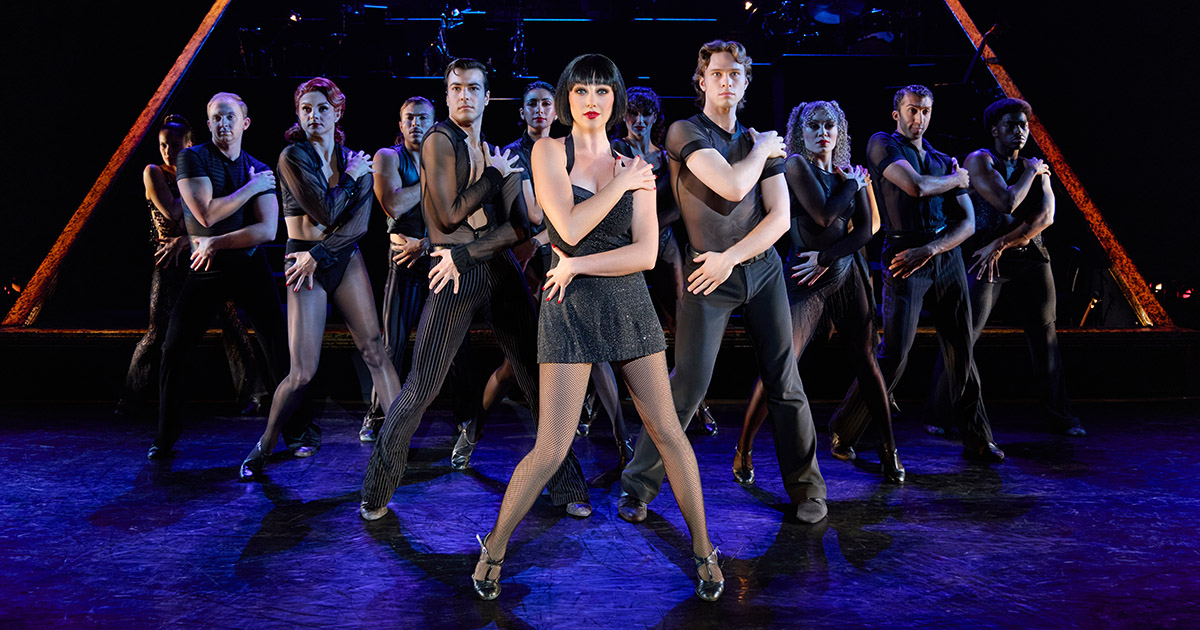There are a few musicals that simply cry out “BROADWAY” at their very mention and, inarguably, Chicago is one of them. The original production of the John Kander, Fred Ebb, and Bob Fosse musical goes back 50 years to 1975, enjoying a New York run of 936 performances. A 1996 revival production of Chicago is still running on Broadway with more than 11,000 performances under its belt. That revival production with direction by Walter Bobbie and choreography by Ann Reinking (after Bob Fosse’s original choreography) has also spawned a number of National Tours, including the current one that is making a stop in Knoxville this week at the Tennessee Theatre for eight performances through Sunday, February 16.
For those who have not seen a performance of Chicago, nor viewed the more narrative dependent, star-heavy Rob Marshal film adaptation from 2002, the satiric premise is all about 1920s Chicago and the lifestyles of the famous and infamous painted in shades of jazz, booze, and compromised ethics. At the center of it all are two women, Velma Kelly, a vaudevillian, and Roxie Hart, a housewife. Both find themselves in the Cook County Jail accused of murder—Velma having killed her husband and sister after finding them in bed, and Roxie having shot her lover and furniture salesman, Fred, in a fit of jealousy. Roxie’s husband, Amos, tries to take the blame for shooting a “burglar”, but the ruse falls through when he realizes Roxie and Fred were on intimate terms.

Enter Billy Flynn, a slick and disingenuous, but handsome lawyer specializing in skillfully representing women accused of murder, turning them into crime celebrities in the process, and getting them acquitted—for a fee. Ruling the roost at the Cook County Jail is Matron “Mama” Morton, who similarly makes things happen for inmates—for a fee. Roxie and Velma find themselves seeking the same things from Flynn and Morton with both realizing that public celebrity and sympathy are what gets them what they need from a jury.
Given the continuing life of Chicago, it isn’t surprising to find a mix of both hand-me-downs and re-creations in terms of the physical and creative production that either adhere to or suggest the original intent. David Hyslop is credited with re-creating the production’s direction, with Gregory Butler re-creating the original choreography. Their focus starts with the characters of the oh-so attractive Velma and Roxie, offered up beautifully and energetically by Taylor Lane and Ellie Roddy, respectively. It is Lane’s Velma that gets the show rolling and makes the dance premise and origin clear with the well-known Fosse-esque “All That Jazz.”

As Billy Flynn, Connor Sullivan added a needed angle to the Velma/Roxie dynamic, his rich voice and clarity a real plus. His Act I song, “All I Care About,” was a satiric gem and a delicious visual jump into vaudeville with a song and dance number complete with chorus girls. Of course, the energetic “Razzle Dazzle” sums up much of what this show is about.
Illeana “illy” Kirvin was simply fantastic as Matron “Mama” Morton, her voice a masterpiece of power and vocal articulation. While she could have sold her slyness and duplicity a bit more, her “When You’re Good to Mama” was a showstopper.
The role of Roxie’s husband, Amos, is one that can make a reputation for a comic actor and is an example of marvelous construction. Doing just that as Amos was Andrew Metzger who sold his character with the comically downbeat number “Mister Cellophane.”
An interesting construction, as well, was the journalist, Mary Sunshine (D. Fillinger) devoted to sensationalizing the “sob sister” murderers. While I won’t give away a little surprise, I will say that this is a voice that deserves the applause.
The John Lee Beatty set offers a visually minimal stage picture, but one that places the orchestra on stage on risers that also allow for entrances and exits. Current musicians were Music Director and Conductor Cameron Blake Kinnear leading an ensemble of reeds, brass, keyboard, and percussion, with a little banjo, mandolin, and ukelele thrown in: pianist Brent C. Mauldin; reeds Jason Whitmore, Heather Kriesel, Clay Steiner; trumpets Jordan Webb, Will Esposito; trombone Andy Sharkey; strings Travis Welch; tubist/bass Garrett Sullivan; percussion Jason Chafatelli; and associate conductor Andy Chen. The ensemble prelude to Act II was not just a return from intermission, it gave the audience a nice overview of the plethora of musical styles in this marvelous song and dance musical.






